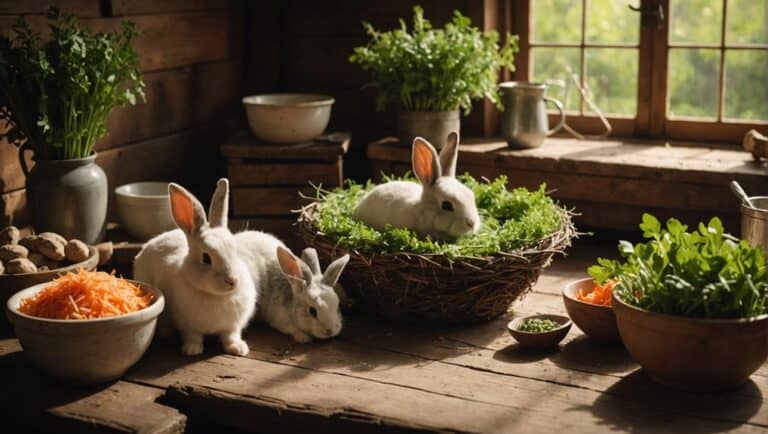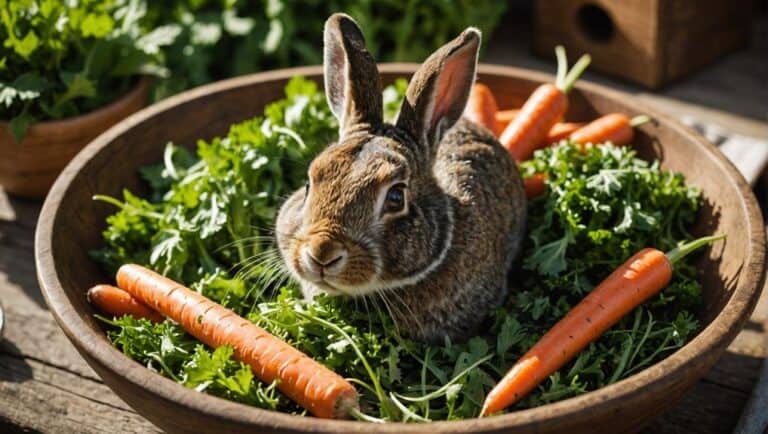Do you ever wonder why water is so vital for bunny nutrition?
While it may seem simple, the role water plays in a rabbit's diet is far more intricate than you might think.
From aiding in digestion to supporting kidney function, hydration is key for your bunny's overall health.
But there's more to it than meets the eye.
Stay tuned to discover the intricate ways water impacts your bunny's well-being and why it should never be underestimated in their diet.
Contents
- 1 Key Takeaways
- 2 Importance of Water for Bunny Digestion
- 3 Water's Role in Bunny Kidney Function
- 4 Hydration for Bunny Temperature Regulation
- 5 Bunny Water Consumption Requirements
- 6 Choosing Water Dispensing Method for Bunnies
- 7 Detecting Dehydration Signs in Bunnies
- 8 Frequently Asked Questions
- 9 How Does Water Play a Role in Balancing Bunny Nutrition?
- 10 Conclusion
Key Takeaways
- Water aids in nutrient absorption and prevents digestive issues in bunnies.
- Hydration supports kidney health by eliminating excess calcium through urine.
- Rabbits rely on water for temperature regulation, preventing dehydration and heat stress.
- Monitoring and ensuring proper water intake is vital for overall bunny health and wellbeing.
Importance of Water for Bunny Digestion
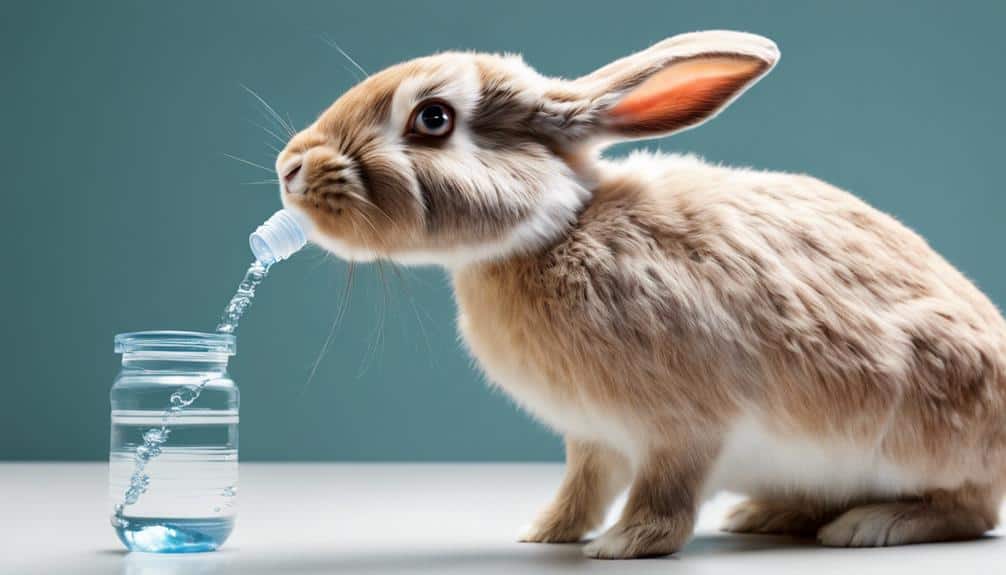
Have you ever wondered why water is essential for maintaining proper gut movement in rabbits? Water plays a critical role in the digestive system of bunnies, aiding in the breakdown and absorption of nutrients from their food. Proper hydration is key to preventing issues like blockages in the gut, which can lead to serious conditions such as Gastrointestinal Stasis. By keeping the food moist in the digestive system, water helps ensure that it can move smoothly through the intestines, reducing the risk of constipation and bloating, especially when rabbits consume fiber-rich foods.
Monitoring your bunny's water intake is crucial for detecting early signs of digestive problems. Changes in water consumption patterns can be an indicator of underlying issues that may require attention. By providing your rabbit with an adequate and consistent supply of water, you're supporting their digestive health and overall well-being. Remember, water isn't just for quenching thirst; it's a fundamental component of your bunny's nutrition.
Water's Role in Bunny Kidney Function
Water in a rabbit's diet plays an essential role in maintaining proper kidney function by aiding in the elimination of excess calcium through urine. Rabbits absorb all the calcium from their food and excrete any surplus through their urine to keep a balance.
If a rabbit doesn't consume an adequate amount of water, it can lead to issues like bladder stones, kidney stones, or bladder sludge due to the improper removal of excess calcium. Hydration is important for preventing kidney problems related to calcium imbalance in rabbits.
Water is a key player in flushing out the extra calcium from a rabbit's body through urine. Ensuring your rabbit maintains consistent water intake is crucial for supporting healthy kidney function and overall well-being.
Hydration for Bunny Temperature Regulation
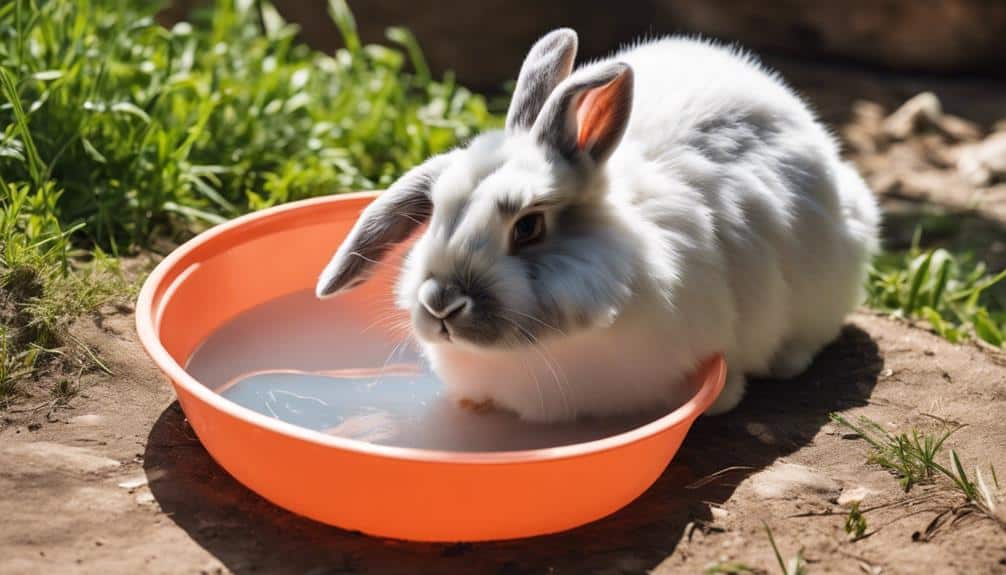
When it comes to regulating their body temperature, rabbits rely on adequate hydration to stay cool and prevent overheating.
Since rabbits can't sweat, drinking water is essential for them to maintain a healthy internal temperature.
Ensuring your bunny stays hydrated is important for their well-being, especially during warm weather when the risk of dehydration and heat stress is higher.
Temperature Regulation Importance
Ensuring proper hydration is critical for rabbits to effectively regulate their body temperature, particularly in warm weather. Water intake plays an essential role in helping rabbits stay cool and prevent dehydration during hot days. Rabbits naturally increase their water consumption in high temperatures to maintain their body temperature within a healthy range.
Hydration for Bunnies
To support effective temperature regulation in rabbits, maintaining proper hydration levels is imperative. Water plays a pivotal role in helping bunnies regulate their body temperature since they lack the ability to sweat.
During warm weather, rabbits drink much water to prevent dehydration and aid in cooling down. Adequate hydration is essential for bunnies to avoid heat-related illnesses and stay cool on hot days.
Monitoring your rabbit's water intake is critical to guarantee they remain adequately hydrated for the best temperature regulation. By providing your bunny with enough water, you help them regulate their body temperature effectively and reduce the risk of dehydration and heat-related issues.
Bunny Water Consumption Requirements
Rabbits have specific water consumption requirements, typically needing around 50ml-150ml of water per kilogram of body weight daily. Factors like the water content in their food and environmental conditions can influence how much they drink.
Monitoring your rabbit's water intake closely is crucial to catch any changes that could signal health issues and make sure they stay properly hydrated.
Hydration for Bunnies
An essential aspect of bunny care involves ensuring adequate hydration by meeting their daily water consumption requirements. Bunnies need approximately 50ml-150ml of water per day per kg of body weight to support proper organ function, blood circulation, and gut movement.
Hydration plays an important role in regulating their body temperature, especially during warm weather when water needs increase. Monitoring your bunny's water intake is important as changes can signal underlying health issues. Insufficient water consumption can lead to severe conditions like Gastro-Intestinal Stasis, highlighting the significance of ensuring bunnies have access to enough water for their well-being.
Remember that adequate hydration is essential for maintaining your bunny's overall health and preventing potential health complications.
Water Bowl Placement
Ensuring best hydration for bunnies involves strategically placing water bowls at ground level for easy access and stability, which is essential for encouraging regular water consumption.
- Use Ceramic Bowls: Rabbits prefer ceramic or heavy bowls to prevent tipping over.
- Provide Multiple Bowls: Make sure multiple water bowls in different areas to encourage hydration.
- Regular Monitoring: Monitor water intake by checking water levels and refilling as needed.
- Prevent Dehydration: Proper hydration is vital for maintaining rabbit health and preventing dehydration.
Monitoring Water Intake
Monitoring water intake in bunnies is essential for ensuring proper hydration levels and overall health. Rabbits should consume around 50ml-150ml of water daily per kg of weight to prevent dehydration and potential health issues like urinary stones or bladder problems. Fresh water should always be available to maintain ideal hydration levels.
Changes in water intake patterns can signal underlying health problems, so monitoring closely is key. Introducing fresh veggies and greens with high water content can help stabilize water consumption. If you notice any early signs of dehydration or irregular water intake, consult a rabbit-savvy vet immediately.
Choosing Water Dispensing Method for Bunnies
When selecting a water dispensing method for bunnies, prioritize using water bottles with sipper tubes to maintain their fur dryness and overall health. Here are some key points to take into account:
- Prevent Wet Fur: Water bottles help prevent bunnies from wetting their fur, reducing the risk of skin infections and discomfort.
- Encouraging Water Intake: Adding a small amount of molasses to the sipper tube can encourage rabbits to use water bottles regularly.
- Ensuring Water Flow: Regularly checking the sipper tube guarantees a continuous and unobstructed water flow, meeting the hydration needs of your bunnies.
- Avoiding Contamination: Water bowls aren't recommended for bunnies as they can lead to contamination and hygiene issues. Using water bottles maintains a clean water source, promoting the overall health of your pets.
Detecting Dehydration Signs in Bunnies
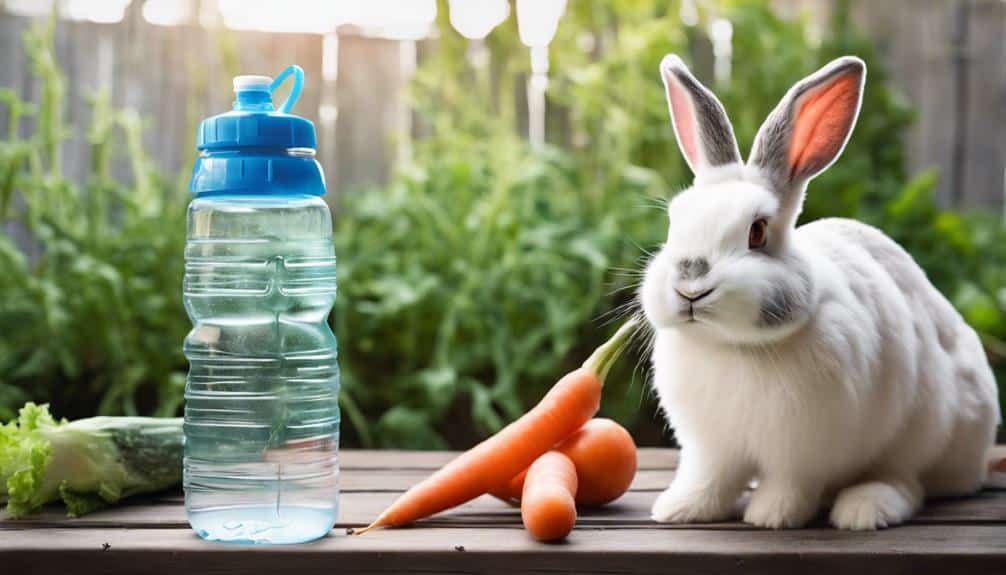
To properly care for your bunny's health, it's essential to be able to recognize the signs of dehydration in rabbits. Dehydration can manifest in various ways, including sunken eyes, dry mouth, lethargy, and loss of appetite. Observing your bunny for decreased skin elasticity and the presence of thick saliva can also indicate dehydration.
Monitoring urine output and noting any changes in the color of urine are valuable indicators of hydration levels in bunnies. Severe dehydration may lead to skin tenting, where the skin stays raised when gently pinched, highlighting the urgent need for intervention. Additionally, dehydrated bunnies may exhibit sticky or dry mucous membranes in their mouth and nose.
Being vigilant and identifying these signs promptly can help you address your bunny's hydration needs effectively, ensuring their overall well-being and preventing potential health complications.
Frequently Asked Questions
What Is the Most Important Nutrient for a Rabbit?
H2O stands as the most essential nutrient for a rabbit. It sustains blood circulation, organ function, and temperature control. Proper hydration aids digestion, gut movement, and calcium regulation. Monitoring water intake reveals health issues, ensuring overall well-being.
What Happens if Rabbits Don't Drink Water?
Without enough water, rabbits risk dehydration consequences like gut blockages, urinary issues, and organ dysfunction. Your rabbit's health relies on adequate water intake to maintain fluid balance, support digestion, and prevent serious health issues. Pay attention to their drinking habits and make sure water sources are accessible.
Why Do Rabbits Drink a Lot of Water?
You drink lots of water because it maintains your hydration levels, aids your digestive system, regulates your body temperature, and prevents dehydration. Your drinking habits impact your overall health, well-being, and the balance of electrolytes in your body.
How Long Can a Bunny Go Without Water?
You can't go long without water. Your hydration levels drop, risking dehydration. Survival instincts trigger thirst signals, urging water intake. Without it, your body struggles with fluid balance, leading to health implications and emergency situations.
How Does Water Play a Role in Balancing Bunny Nutrition?
Water is the key to bunny nutrition as it plays a critical role in digestion and overall health. It helps maintain proper hydration, supports nutrient absorption, and aids in the regulation of body temperature. Fresh, clean water should always be readily available to ensure a balanced diet for bunnies.
Conclusion
In summary, water is the lifeblood for bunnies, playing a vital role in maintaining their health and well-being. As the saying goes, 'you can lead a horse to water, but you can't make it drink,' it's essential to make sure that bunnies have constant access to fresh water to support digestion, kidney function, temperature regulation, and overall hydration needs.
Monitoring water consumption and detecting signs of dehydration are key aspects of responsible bunny care.

